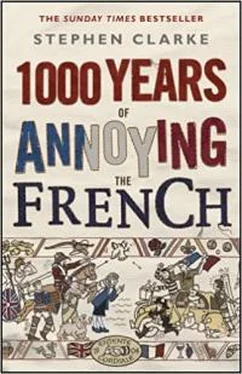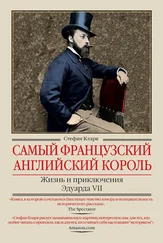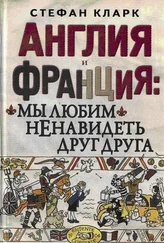Стефан Кларк - 1000 Years of Annoying the French
Здесь есть возможность читать онлайн «Стефан Кларк - 1000 Years of Annoying the French» весь текст электронной книги совершенно бесплатно (целиком полную версию без сокращений). В некоторых случаях можно слушать аудио, скачать через торрент в формате fb2 и присутствует краткое содержание. ISBN: , Издательство: Transworld Digital, Жанр: Старинная литература, на английском языке. Описание произведения, (предисловие) а так же отзывы посетителей доступны на портале библиотеки ЛибКат.
- Название:1000 Years of Annoying the French
- Автор:
- Издательство:Transworld Digital
- Жанр:
- Год:неизвестен
- ISBN:9781407067629
- Рейтинг книги:3 / 5. Голосов: 1
-
Избранное:Добавить в избранное
- Отзывы:
-
Ваша оценка:
- 60
- 1
- 2
- 3
- 4
- 5
1000 Years of Annoying the French: краткое содержание, описание и аннотация
Предлагаем к чтению аннотацию, описание, краткое содержание или предисловие (зависит от того, что написал сам автор книги «1000 Years of Annoying the French»). Если вы не нашли необходимую информацию о книге — напишите в комментариях, мы постараемся отыскать её.
1000 Years of Annoying the French — читать онлайн бесплатно полную книгу (весь текст) целиком
Ниже представлен текст книги, разбитый по страницам. Система сохранения места последней прочитанной страницы, позволяет с удобством читать онлайн бесплатно книгу «1000 Years of Annoying the French», без необходимости каждый раз заново искать на чём Вы остановились. Поставьте закладку, и сможете в любой момент перейти на страницу, на которой закончили чтение.
Интервал:
Закладка:
After this moment of euphoria, digging work dragged on for a year beyond target, and it was announced that the budget had doubled to £12 billion. Britain’s eternal cynicism about France’s intentions turned out to be justified when it was realized that, contrary to the rules, the French state had been underpinning its side of the project because its banks were partly nationalized (one wonders why the first two words of the name Banque Nationale de Paris didn’t give the game away?).
On 6 May 1994, after almost 200 years of talking and planning, the tunnel was finally completed. The Queen was allowed to invade France first, and travelled under the Channel to an opening ceremony in Calais. President Mitterrand then returned with her to Folkestone to open the other end of the tunnel. And around 200 million similar passenger journeys have been made since that day.
There have been many financial problems in the interim, of course, as well as the occasional strike and accident to hold things up, but the tunnel has been welcomed almost universally as a miraculous innovation. The days of stumbling half-asleep across the wind-blown docks of one of the Channel ports in the middle of the night and trying to grab a seat on a clanky train that would spend several hours grinding to London or Paris are over. The ferries have also upped their game and are cruise liners compared to the tubs of the monopoly days.
Nevertheless, the weight of Anglo-French history pressing down on the tunnel roof has guaranteed that the griping and sniping won’t stop just because a few engineers managed to get things right.
First, there came the French amusement that the Brits couldn’t get permission for their high-speed rail link. Instead of ignoring or paying off protesters and ploughing a track through the empty fields of northern France, British planners had to ask permission of practically every suburban garden-owner in Kent, and they all said no. Consequently, as Mitterrand quipped during his first visit, French tourists would have plenty of time to admire the famous English countryside as they pottered along the old railway from Folkestone to London at 20 m.p.h.
This, though, was nothing compared to the historical snub of having the London-bound trains arrive at Waterloo, the station named after the French defeat that marked the downfall of Napoleon, the man who had actually dreamed up the tunnel project. If de Gaulle had been alive, he would probably have sent Exocets through the tunnel rather than allow the humiliation to go ahead.
The only semi-official objection to the Waterloo terminal took a long time coming. In 1998, a right-wing city councillor in Paris’s 1st arrondissement called Florent Longuépée (‘long sword’, the name of William the Conqueror’s great-great-grandfather) wrote to Tony Blair demanding that the station undergo a name change. Otherwise, Longuépée threatened, he would campaign to change the name of the Gare du Nord to Fontenoy. This meant absolutely nothing to the Brits and not much more to the Parisians, but was in fact the name of a 1745 battle in Belgium at which French troops routed an Anglo-Austro-Dutch-German army. The battle is only remembered (if at all) because the Gardes françaises chivalrously offered the English Foot Guards the chance to take the first shot. It is a gesture that is always put forward as an example of French courage, which is false for two reasons. First, it was a devious strategy – a line of musket-bearing soldiers who have just fired would take some minutes to reload, during which time their adversaries could dash towards them and take a shot from much closer range. And secondly, the French writer Voltaire tells a version of the story in which the English made the offer first, and the French cunningly saw through the ruse and threw it back in their faces.
Be that as it may, it is just another example of the way the French and Brits can never really agree on anything. As we know, neither Waterloo nor the Gare du Nord had its name changed, and in any case, the Brits have now moved the Eurostar terminal to St Pancras station, which is politically far less inflammatory. (Or is it? More on that later.)
And today, the tunnel is a symbol of Anglo-French synergy, while the Eurostar train (built by a French company, of course) is a place where you can use euros or pounds, speak English or French (and occasionally Flemish) and even take it in turns to smile at the cute accents of the train managers who make the service announcements. Napoleon and Josephine would have been on it every weekend.
A law against English
Just a few months after the Channel Tunnel was opened, the French erected a sea wall. Not to protect itself against the effects of global warming, but to hold back the rising tide of English that (so they thought) was sweeping French off the linguistic map.
As we saw in the last chapter, France has long been suspicious of rock’n’roll and Hollywood, and in August 1994 the country’s Minister of Culture and the French Language published a law designed to stop the Anglo-American invasion once and for all.
The minister, Jacques Toubon, was not first and foremost a cultural man – he was a career politician, a graduate of France’s elite École nationale d’administration (ENA), a right-hand man of Jacques Chirac during the latter’s career in various ministries. Toubon was as qualified to head the Ministry of Culture as he was to run the railways, a tax department or Chirac’s election campaigns.
When he took over the job in 1993, he gave a speech saying that he wanted to promote ‘culture that makes each man a responsible citizen’. To most of us, this sounds like total gobbledygook, but to French politicians who knew the ENA, it was a comfortingly vague piece of admin-speak – other ministers were simultaneously making speeches that were exactly the same except that the word ‘culture’ was replaced by words like ‘army’, ‘nuclear power’ and ‘cheese’.
Toubon’s first move was, typically, to reorganize large cultural institutions like the Louvre, the Opéra national and the Bibliothèque nationale (France’s national library), giving top jobs to ‘associates’. Again, it was so far, so ENA.
But Toubon surprised almost everybody when he imposed his ‘Law 94-665 Relating to the Use of the French Language’, which sought quite simply to impose French on France. Its first article decreed that ‘in the designation, offer, presentation, instructions for use and utilization, 1description of size, and conditions of guarantee of goods, products, or services, as well as in invoices and receipts, the use of the French language is obligatory’.
In addition, all advertising – written, spoken or audiovisual – had to be in French; the creation of a brand name in a foreign language was forbidden if a French equivalent existed; French-based companies couldn’t insist that its employees had to speak or understand English; and teaching had to be in French if a school wanted public funding (the Bretons had to fight for the right to use their language in state schools).
Toubon reserved the most severe measures for music and TV. ‘Before 1 January 1996,’ the law stipulated, ‘the proportion of musical works written or performed by French or French-speaking artistes broadcast in popular music programmes during prime time by all radio stations must reach a minimum of 40 per cent.’ Toubon added that it was compulsory for TV channels to broadcast ‘at least twice a week, during prime time, programmes created in French’, a move to limit the number of (highly popular) American TV series being watched.
Apart from the fact that the French hate obeying new laws, this felt a bit like the Dutch boy sticking his finger in the dyke. The English language was already an integral part of French popular culture, and stars like Serge Gainsbourg and even Johnny Hallyday had performed songs with English titles. So the fightback began almost immediately – the French love playing with words, and translated Toubon himself into English, as Jack Allgood (for the French tout bon ). And most French people treated the law as a joke.
Читать дальшеИнтервал:
Закладка:
Похожие книги на «1000 Years of Annoying the French»
Представляем Вашему вниманию похожие книги на «1000 Years of Annoying the French» списком для выбора. Мы отобрали схожую по названию и смыслу литературу в надежде предоставить читателям больше вариантов отыскать новые, интересные, ещё непрочитанные произведения.
Обсуждение, отзывы о книге «1000 Years of Annoying the French» и просто собственные мнения читателей. Оставьте ваши комментарии, напишите, что Вы думаете о произведении, его смысле или главных героях. Укажите что конкретно понравилось, а что нет, и почему Вы так считаете.












